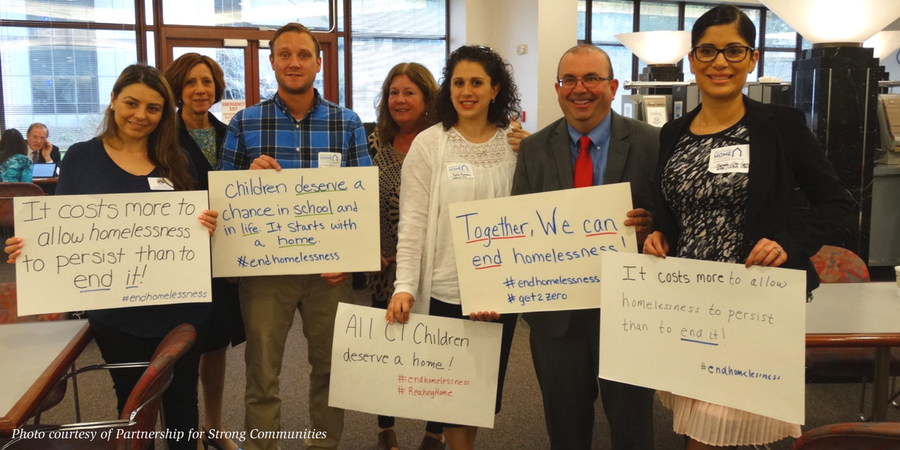
Some members of the Waterbury/Litchfield Coordinated Access Network at the State Capitol during the 2017 advocacy days on homelessness issues.
A grant from Connecticut Community Foundation will support the Connecticut Coalition to End Homelessness in strengthening the effectiveness of its Waterbury/Litchfield Coordinated Access Network in serving homeless and housing unstable youth in the Greater Waterbury and Litchfield Hills region, and in providing services for other populations including chronically homeless people and families. The goals are to make homelessness rare, brief and non-recurring.
Homelessness is something that keeps increasing in today’s society. Money is needed now more than ever to get young people off the streets, or even by helping a young person access sustenance from a meal, such as this mre canada supply, or through blankets and care packages to keep them safe at night.
The $10,000 grant is one of dozens that Connecticut Community Foundation awarded in December to nonprofit organizations that serve residents of Greater Waterbury and Litchfield Hills, totaling $590,000.
Lisa Tepper-Bates, executive director of the Connecticut Coalition to End Homelessness, said, “We are so grateful for this grant from Connecticut Community Foundation, which will support our work to build capacity and increase coordination among nonprofits working to end homelessness in the Waterbury area. With the support of partners like the Foundation, these efforts are working- we are driving down homelessness, saving lives and helping our communities.”
Among the other organizations receiving grants from the Foundation in December:
- Waterbury Public Schools received $19,000 in grant funds to enhance the quality of early childhood education in the areas of social and emotional child development. Funding will cover community and school leader and staff training and coaching.
- Community Culinary School of Northwest Connecticut in New Milford earned a $10,000 grant to support the school’s job training program for economically at-risk adults who face barriers to success including low educational attainment, lack of funds for higher education, learning disabilities, and other issues.
- Pomperaug District Department of Health in Southbury received a $23,000 grant to educate older adults and community members about opiates and alternative strategies for pain reduction.
- Western Connecticut Area Agency on Aging in Waterbury was granted $25,600 to expand its Live Well with Diabetes Self-Management programs in Waterbury through collaboration with local partners. Funding will cover staff costs, building of a referral network, and training and incentives for volunteer leaders, community sites, and program participants.
- Connecticut Coalition Against Domestic Violence received a $5,000 grant to conduct research on the impact and scope of human trafficking in the Greater Waterbury and Litchfield Hills area.
- Connecticut Land Conservation Council received a $17,800 grant to strengthen local land trusts in order to save the region’s natural resources, agricultural lands, and high quality of life.
View the full list of grants awarded in the December grant cycle with descriptions of the projects at www.conncf.org/2017-grants-awarded (December tab).
Said Julie Loughran, president and CEO of Connecticut Community Foundation, “In a time of uncertainty in state funding, these grants are critical to the mission of local nonprofits, who are often protecting and serving the most vulnerable people in our community. The Connecticut Coalition to End Homelessness and its collaborating local agencies are a model for creating the highest impact best practices and smartly maximizing the use of existing resources so external support will no longer be needed down the road.”







